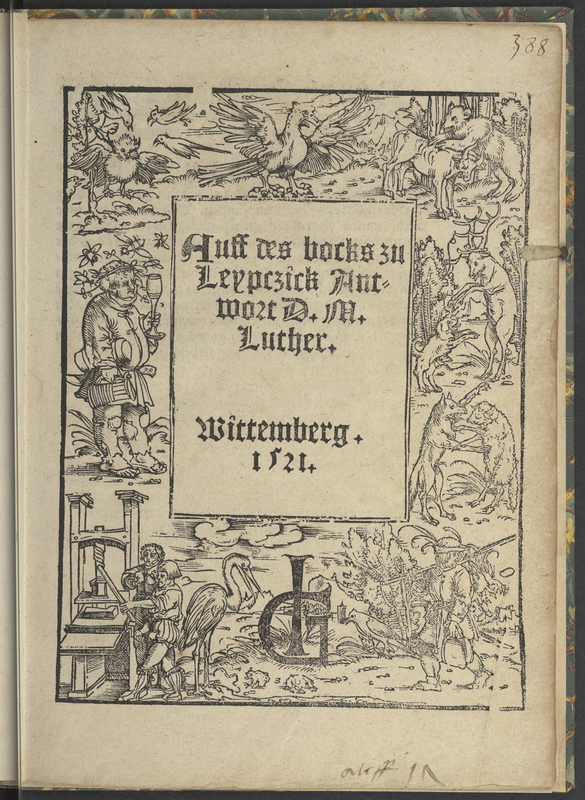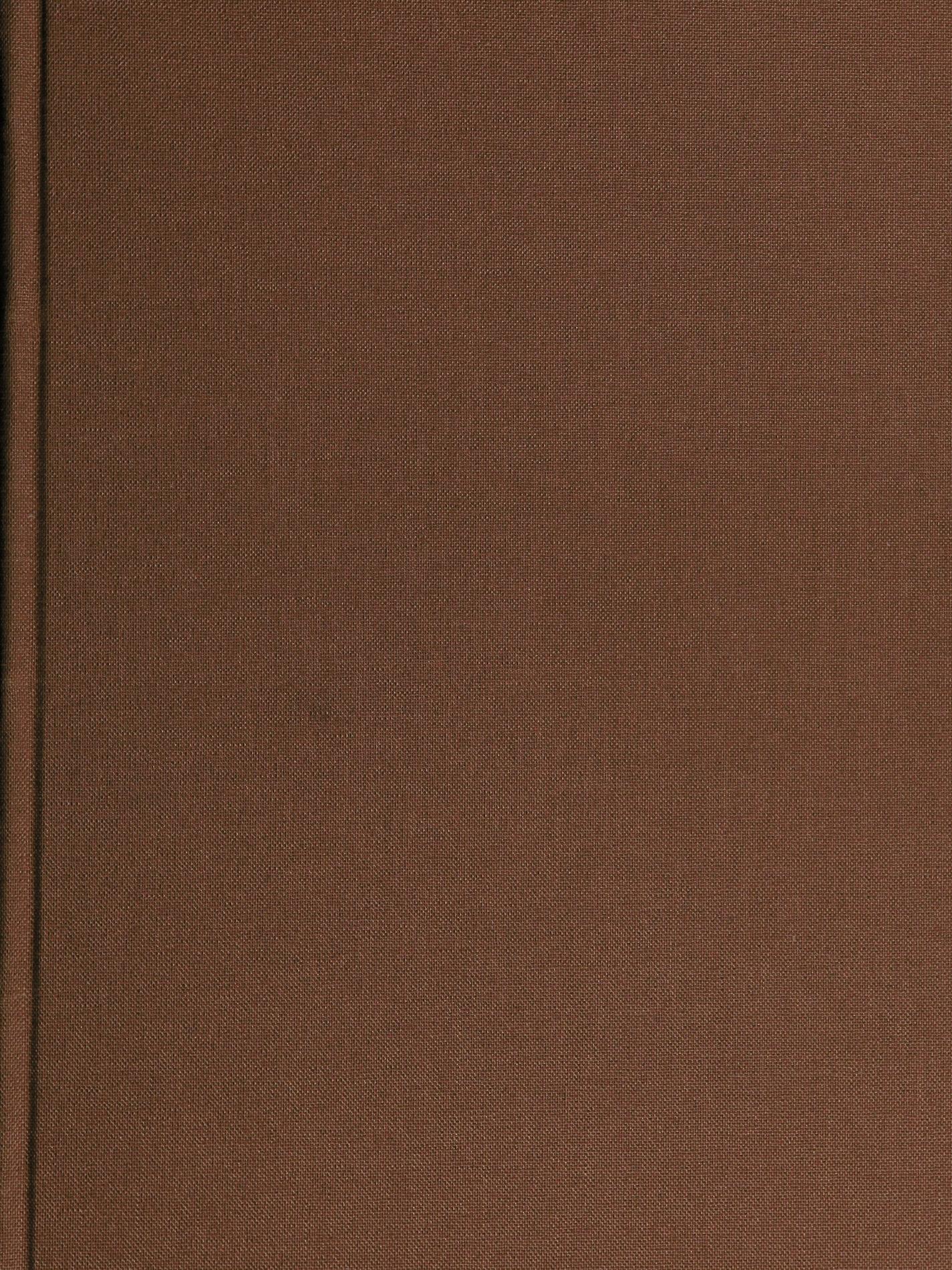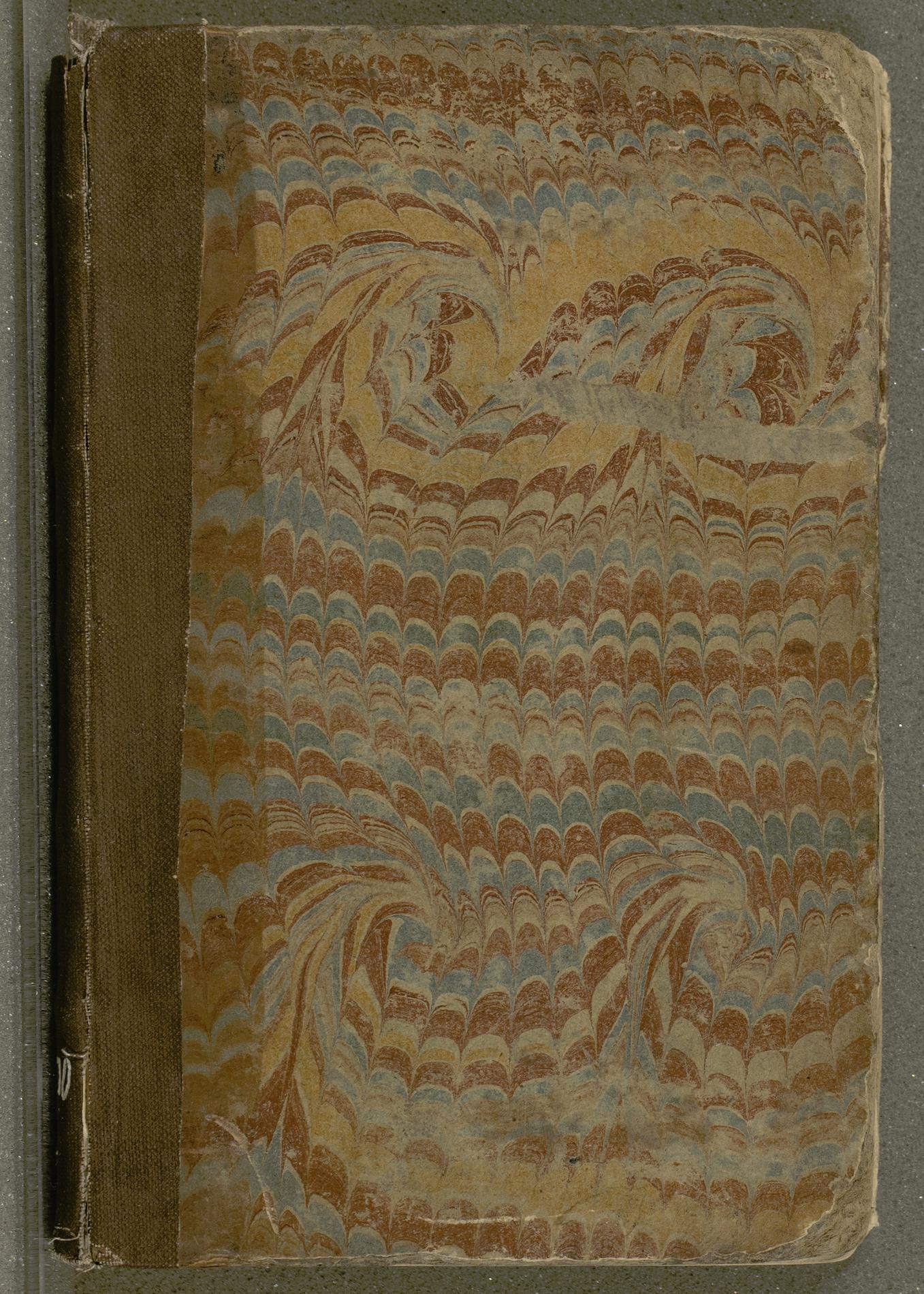Search
-
 Still image
Still imageHistoriated title page of De Biblie
Altdorfer, Erhard, approximately 1480-approximately 1570The title page of Martin Luther's Low German translation of the Bible featuring a collection of biblical scenes and symbols based on Lucas Cranach the Elder's painting, "Law and Gospel" (or "Sin and Redemption"). On the left of the image are scenes representing Law/Sin, including: a dead tree, Moses receiving the Ten Commandments, Adam and Eve, the brazen serpent, and a corpse lying atop a tomb. -
![The title page of Thomas Netter's Doctrinalis antiquitatu[m] ecclesiae Iesu Christi liber quintus, ac tomus secundus de sacramentis, editus in Vvitcleffistas, & eoru[m] asseclas featuring a central image of a printer's workshop with two men operating the press and a third arranging type. A decorative border surrounds the title and cetral image, including several cherubs, stylized fish, sirens, and armor.](https://s3.us-west-2.amazonaws.com/omekacloud-main/large/P_300000098790_P00X/1521NETT_300000098790_P00X.jpg) Still image
Still imageHistoriated title page of Doctrinalis antiquitatu[m] ecclesiae Iesu Christi liber quintus, ac tomus secundus de sacramentis, editus in Vvitcleffistas, & eoru[m] asseclas
The title page of Thomas Netter's Doctrinalis antiquitatu[m] ecclesiae Iesu Christi liber quintus, ac tomus secundus de sacramentis, editus in Vvitcleffistas, & eoru[m] asseclas featuring a central image of a printer's workshop with two men operating the press and a third arranging type. A decorative border surrounds the title and cetral image, including several cherubs, stylized fish, sirens, and armor. -
 Still image
Still imageHistoriated title page of Passional Christi vnnd Antichristi
Cranach, Lucas, 1472-1553The title page of Martin Luther's Passional Christi vnnd Antichristi featuring an architectural arch decorated with floral and vegetal patterns, a pair of cherubs framed with grape vines holding up the title from the top of each side of the arch. -
 Still image
Still imageHistoriated title page of Auff des bocks zu Leypczick Antwort
The title page of Martin Luther's Auff des bocks zu Leypczick Antwort featuring several scenes, including: two men operating a printing press (bottom left), a man wearing worn clothes and carrying two flaggons and a cup with bees flying arouns his head (center left), an owl being harrassed by smaller birds (top right), an eagle (top center), a bear attacking a cow (top right), a dog attacking a deer (top-center right), a wolf attacking a sheep (bottom-center right), a man with a pole and a satchel (bottom right), and a heron standing beside Johann Rhau-Grunenberg's monogram "IG -
 Still image
Still imageHistoriated title page of Io Frobenius studiorum liberalium mystis, s.d : Quo sæpius hoc opus uobis redit, optimi Iuuenes, hoc debet esse gratius. Redit enim subinde, cum emendatis, tum locupletius. Qui nouam æditionem emunt, lucrum faciunt, qui ueteribus contenti sunt, certe nihil faciũt damni. In hac non ita multum accessit paginarum, sed rerum nõ pœnitendum auctarium, valete, & nostræ fauete industriae. ... Ex quarta autoris recognitione
Graf, Urs, approximately 1485-approximately 1527The title page of Desiderius Erasmus' Io Frobenius studiorum liberalium mystis, s.d : Quo sæpius hoc opus uobis redit, optimi Iuuenes, hoc debet esse gratius. Redit enim subinde, cum emendatis, tum locupletius. Qui nouam æditionem emunt, lucrum faciunt, qui ueteribus contenti sunt, certe nihil faciũt damni. In hac non ita multum accessit paginarum, sed rerum nõ pœnitendum auctarium, valete, & nostræ fauete industriae. ... -
 Text
TextEtlich Cristlich lider Lobgesang, vn[d] Psalm : dem reinen wort Gottes gemess, auss der heylige[n] schrifft, durch mancherley hochgelerter gemacht, in der Kirchen zu sigen, wie es dann zum tayl berayt zuo Wittenberg in übung ist
Summary: This is the first volume of printed hymns for church use ever compiled. Jobst Gutknecht, the Nuremberg printer, gathered eight broadside hymns into one collection, thus making the world's first church hymnal. Four hymns are by Luther, three are by Paul Speratus, and one is anonymous. -
 Text
TextPassional Christi vnnd Antichristi
Luther, Martin, 1483-1546Summary: A polemic in the form of thirteen pairs of woodcuts (with captions) depicting scenes from the life of Christ contrasted with scenes from the life of the Pope. The text for the Latin edition was by P. Melanchthon and J. Schwertfeger, while that for the German edition was by M. Luther. The text consists of quotations from the Gospels and the canon law. This collaborative effort between Lukas Cranach and Luther is among the more famous pieces of popular propaganda provided during the reformation. Luther wrote the German texts to accompany Cranach's woodcuts. -
 Text
TextA sermon, on gods governing the world; : preached in London in ... 1682
Slater, Samuel, -1704Summary: -
 Text
TextTwo farewell sermons
Whitefield, George, 1714-1770Summary: Sermons delivered before Whitefield's departure on his final trip to Georgia and published in England following the news of his death. -
 Text
TextAn elegy on the late Reverend George Whitefield, M.A. who died September 30, 1770, in the 56th year of his age
Wesley, Charles, 1707-1788Summary: An elegy celebrating George Whitefield. -
 Text
TextThe Christian history, or a general account of the progress of the Gospel in England, Wales, Scotland and America
Whitefield, George, 1714-1770Summary: Correspondence of Whitefield and other missionary Methodists in Great Britain, New England, South Carolina and Georgia, written 1746-July 1748. -
 Text
TextThe Christian history : or, A general account of the progress of the gospel, in England, Wales, Scotland, and America : so far as the Rev. Mr. Whitefield, his fellow-labourers, and assistants are concerned
Whitefield, George, 1714-1770Summary: A collection of letters by George Whitefiled and others -
 Text
TextThankfulness for mercies received a necessary duty: : A farewel sermon preached on board the Whitaker, at anchor near Savannah in Georgia, on Sunday May the 17th [i.e. 7th?] 1738
Whitefield, George, 1714-1770Summary: "After nearly four months at sea on the Whitaker, anchored near Savannah, Georgia, Whitefield preached this farewell sermon to his shipmates, urging thankfulness to God for their safe arrival..." -
 Text
TextThe eternity of hell torments : a sermon preached at Savannah in Georgia
Whitefield, George, 1714-1770Summary: -
 Text
TextAn answer to every man that asketh a reason of thehope that is in us. By way of question and answer
Whitefield, George, 1714-1770Summary: -
 Text
TextA letter to the Reverend Mr. John Wesley : in answer to his sermon, entituled, Free-grace.
Whitefield, George, 1714-1770Summary: -
 Text
TextA sermon on the death of the Rev. Mr. George Whitefield. : Preached at the chapel in Tottenham-court-road, and at the tabernacle near Moorfields, on Sunday, November 18, 1770
Wesley, John, 1703-1791Summary: "According to Whitefield’s wishes, his long-time friend and fellow founder of Methodism, John Wesley, preached this funeral sermon at both of Whitefield’s London chapels. While Whitefield’s Calvinist colleagues understandably objected to Wesley’s omission of his Calvinism, it was nonetheless a heartfelt tribute to his dear friend and fellow evangelist. -
 Text
TextBritain's mercies, and Britain's duty. : Represented in a sermon preach'd at Philadelphia, on Sunday, August 24, 1746. And occasioned by the suppression of the late unnatural rebellion
Whitefield, George, 1714-1770Summary: "...a political sermon by Whitefield displaying the British Protestant patriotism and anti-Catholicism that he shared with many evangelicals." -
![Summary: "This sixteen-page pamphlet includes two 1744 letters from James Habersham to Whitefield relating to the Bethesda (house of mercy) Orphan House ... [providing] details on the spiritual and temporal condition of the orphanage."](https://s3.us-west-2.amazonaws.com/omekacloud-main/large/P_000015004340/1744HABE_000015004340.jpg) Text
TextA letter from Mr. Habersham ... to the Reverend Mr. Whitefield: : containing a particular account of the spiritual and temporal state therof. Dated March 2, 1744, and sent with others, bearing date June 7. Publish'd at the request of his friends
Habersham, James, 1715-1775Summary: "This sixteen-page pamphlet includes two 1744 letters from James Habersham to Whitefield relating to the Bethesda (house of mercy) Orphan House ... [providing] details on the spiritual and temporal condition of the orphanage." -
 Text
TextA vindication and confirmation of the remarkable work of God in New-England. : Being some remarks on a late pamphlet, entitled, the state of religion in New-England, since the Rev. Mr. George Whitefield's arrival there. In a letter to a minister of the Church of Scotland
Whitefield, George, 1714-1770Summary: "Whitefield’s letter replies to an anonymous pamphlet that was critical of the revival in New England, questioning its authenticity and labelling it fanatical."